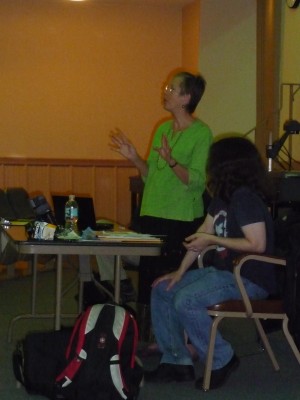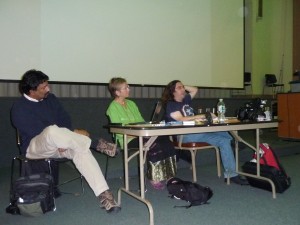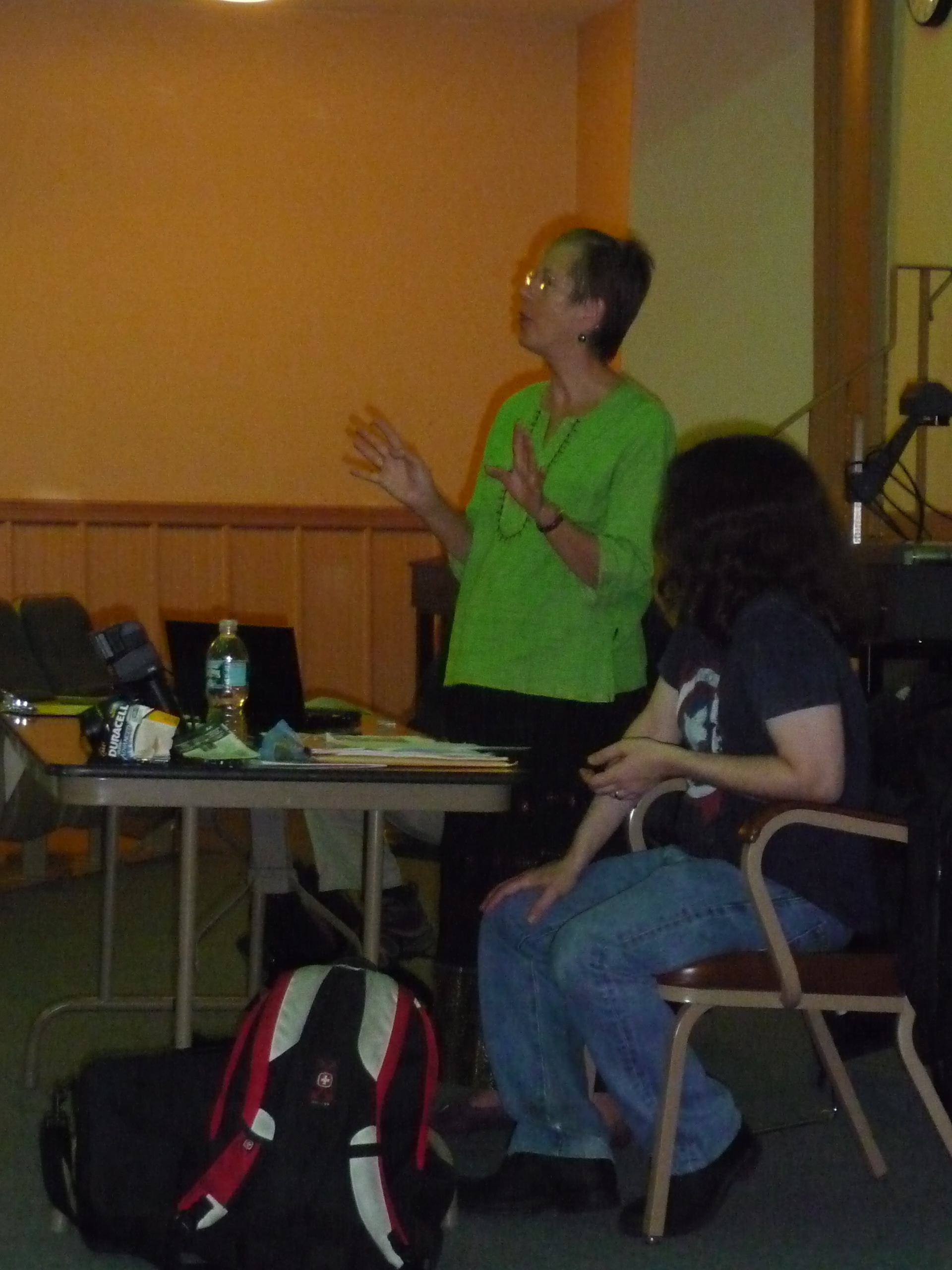
“Apartheid is two things – apart and hate,” said Dr. Barbara Brown in front of an audience at Morse Auditorium on Tuesday night.
Brown has been the Director of the Outreach Program at the African Studies Center at Boston University since 1990. She, along with Jason Pramas, the editor and publisher of the weekly news publication Open Media and Suren Moodliar, a coordinator of Massachusetts Global Action, held a talk about the movement at BU to end South African apartheid. The event, “Ending Apartheid: A Legacy of Struggle at B.U.”, was hosted by B.U. Students for Justice in Palestine.
Pramas, who was active member of the South African Task Force at BU, (which he describes as “fighting for justice under Silber’s iron fist,” when he attended from 1984-1986), provided a chronological timeline of events laced in with his own experiences and many “f*ck yous” to various BU administrations. In 1979, B.U. had approximately $6 million in common stock in companies active in South Africa. Pramas and Brown, along with other students and faculty were committed to ending the university’s support to the Apartheid Regime. The South African Task Force held demonstrations at Marsh Plaza, vigils at then President John Silber’s office, got 2000 students to sign a petition, set up shantytowns at Marsh Plaza, held hunger strikes, and were even arrested along the way. However, the main obstacle was to convince the board of trustees.
“It was lots and lots of tiring work, but friendships and even successful marriages were made along the way,” said Brown.
Pramas was a was assistant to the assistant editor of the Daily Free Press, part of the COM Government, and the College of Communication Senator for the Student Union. Pramas said he led BU Student Union senators to hold a university election for the divestment of university funds from the South African economy in 1985.

“I was subsequently removed from the Student Union senate,” Pramas said.
Eventually, he was removed from all positions. Later, Pramas was suspended and then left BU in 1986.
Despite all this, the activists finally won when, in collaboration with a group of other anti-apartheid activists from Massachusetts called “Massachusetts Divest,” got BU, along with other Massachusetts universities, to divest their pension holdings in South Africa.
“My daughter was six months old at the time, and when we found out we won, she rolled over for the first time,” said Brown.
MassDivest was featured on the front page of the South African Press. Nelson Mandela visited Boston in 1990 to honor their efforts.
Students, many who are active in the Students for Justice in Palestine organization, also posed questions to the speakers about the differences in the movements against apartheid in South Africa and now in Israel.
“What we’re doing now, we would have probably been stopped for doing 20 years ago,” said Pramas.
Moodliar, a former member of the African National Congress, told the audience that they would be able to tell when their anti-apartheid activism was working.
“When a government can’t perform its duties because of international dissent, that’s a good time to move against it,” he said.
Brown also had optimistic advice for student activists.
“They’ll tell you that you won’t win, but it’s all lies,” she said. “I know it’s all lies because we won.”


Wow, I was just getting ready to issue a correction to the Daily Free Press, and now I see I have to do the same in the Quad. Pity … I had expected more of this publication.
First of all, the anti-apartheid movement lost at BU. I thought I made that quite clear … given that my talk was entitled “[not] Ending Apartheid: the Legacy of the Defeat of the Student Anti-Apartheid Movement at Boston University.” BU never fully divested its holdings in corporations doing business in South Africa. As I mentioned, it had over $10 million in such investments by 1985. I believe that Barbara was referring to the overall international movement to the divestment of the Commonwealth of Massachusetts in 1983 and the City of Boston in 1984 – and an earlier partial divestment by BU that she recounted in her talk – when she mentioned victory.
Second, I specifically said that I led a minority faction of senators in the BU Student Union in a fight to attempt to pass a series of progressive resolutions in 1986 which included supporting divestment. They were all shot down. And the Silber administration used its control over the Student Union leadership to make sure they were shot down, and that I was illegally removed from student government.
Third, I put a great deal of stress on the fact that 11 student activists – the BU 11 – were disciplined by the Silber administration in June 1986, which effectively cut the head off the student movement by Fall 1986. And I got the worst sentence. One year suspension and disciplinary probation until graduation. Meaning I was thrown out of school. The author makes it seem like I left of my own volition that year. Not so. Hence, my recounting my use of invective to administration officials (and BU police) on two or three occasions in 1986. I’m sure you’d be angry, too, if you were treated the way my colleagues and I were treated for engaging in protected free speech activities that wouldn’t have caused the slightest problem on most American campuses in that period.
In addition, missing here is any mention of my discussion of the importance of the BU South Africa Task Force as the last major student movement on campus since the 1980s. There were over 200 student activists led by a couple of dozen students that functioned as leaders working to get BU to divest from South Africa in Spring 1986. I was but one of many activists, and I pointed out that current activists on Israel/Palestine issues should work with me to put together a symposium featuring more people from my era to try to get a broader picture of what we did and how we did it. I think it would be worth the effort.
Finally, as regards justice for the Palestinian people, I said that many people active in the anti-apartheid movement in the U.S. would go on to become active in the Free Palestine movement. And I recounted specific incidents where pro-Israel forces in the anti-apartheid movement actually accelerated the entry of American student activists like myself into pro-Palestinian cause with their ham-fisted attempts to convince us that there were no significant military connections between the Israeli government and the apartheid South African government of the period. In his remarks, Suren mentioned that those connections are now a matter of well-documented historical record.
I will publish links on this page to the audio and (some) video of this event when I put them up on Open Media Boston. Hopefully, that will complete setting the record straight on what transpired at the event.
addendum: the last sentence of the second paragraph in my comment above should read “I believe that Barbara was referring to the success of the overall international Free South Africa movement, as well as to the divestment of the Commonwealth of Massachusetts in 1983 and the City of Boston in 1984 – and an earlier partial divestment by BU that she recounted in her talk – when she mentioned victory.”
As someone who attended this event I think this blog post does a fair job of recapturing the sentiments of the discussion, which is the purpose of a blog post. As far as Mr. Pramas’ comments I feel as though he is not justified in berating the author of this article, Shivani Mathur, considering you only spoke for a total of 20 minutes in addition to comments afterwards. Because I am interested in your experience at BU I appreciate that you wanted to elaborate on your platform and history, but I think the way in which you presented yourself above was both rude and selfish. This is not about who is right and who is wrong, but how student activists have evolved on campus and what we can do now to accomplish the goals we have in mind. We appreciate your sacrifice as a student activist, your efforts still resonate strongly amongst students today at BU.
I agree with Hannah. Clearly, Mr. Pramas’ expectations for this article were a bit much, and his method of voicing his concerns in the commests sections seems extremely rude. After reading the article and Mr. Pramas’ subsequent comments, it seems that none of the information Ms. Mathur wrote was incorrect at all, but simply not clear enough or elaborated upon to Mr. Pramas’ liking.
It’s one thing to submit corrections to a publication, but its another to rewrite the article. I thought the piece was clear, straightforward, and gave as much information about Mr. Pramas’ lecture as the reader needed to know. However, according to the comments section, it seems the only one qualified to write an article on Mr. Pramas’ lecture is Mr. Pramas himself.
Hannah Siegel: “This is not about who is right and who is wrong, but how student activists have evolved on campus and what we can do now to accomplish the goals we have in mind.”
Anonymous: “…it seems that none of the information Ms. Mathur wrote was incorrect at all, but simply not clear enough or elaborated upon to Mr. Pramas’ liking.”
Found this article while researching a paper on the antiapartheid movement and was kind of surprised by some people’s comments. Looks to me like the reporter got her facts totally wrong and subject of the article called her on it. Which I think was the right thing to do. Sounds like some fans of this paper have a funny idea of what journalism is all about, or history for that matter.